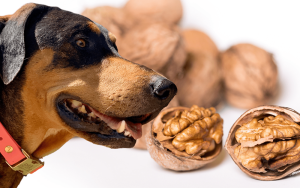Can Dogs Eat Almonds? Understanding the Risks and Benefits

As dog owners, we often look for ways to spoil our furry friends with tasty treats, but it’s crucial to remember that not all human foods are safe for pets. One of the more common questions is whether dogs can eat almonds. Almonds are a popular snack
for humans due to their nutritional value, but when it comes to your dog, things are not so clear-cut. This comprehensive article will delve into whether almonds are safe for dogs, the potential risks involved, and what you should do if your dog eats
almonds.
Table of Contents:
- Introduction: Almonds and Dogs – A Closer Look
- Are Almonds Safe for Dogs?
- Potential Health Risks of Almonds for Dogs
- Signs of Almond Toxicity in Dogs
- Benefits of Almonds for Dogs (If Safe)
- What to Do If Your Dog Eats Almonds
- Alternatives to Almonds for Dog Treats
- Conclusion
1. Introduction: Almonds and Dogs – A Closer Look
Almonds are a popular and nutritious nut for humans. They are packed with healthy fats, fiber, protein, and various vitamins and minerals, making them a go-to snack for many people. But as a dog owner, you may wonder: Can my dog share in the joy of eating
almonds? While some human foods are dog-friendly in moderation, others can pose significant risks. Almonds fall into a gray area, and understanding the potential dangers and benefits is crucial for making the right decision.
This article will explore whether almonds are safe for dogs, the risks they may pose, and how to handle situations where your dog eats almonds.
2. Are Almonds Safe for Dogs?
Almonds are not inherently toxic to dogs, but that doesn’t mean they’re necessarily safe for them to eat. The truth is, almonds can present a variety of health concerns, and it’s essential to consider them carefully.
Almonds are high in fat, and while healthy fats are an essential part of a dog’s diet, they can lead to digestive issues or even pancreatitis if consumed in large quantities. In addition, almonds are difficult for dogs to digest because they are high
in fiber and require more effort to break down. This can lead to gastrointestinal upset, including vomiting, diarrhea, and discomfort.
Another concern is the size and shape of almonds. Their hard texture and small size can be a choking hazard, especially for smaller dog breeds. If a dog swallows an almond whole, it could become stuck in the esophagus or digestive tract, requiring emergency
veterinary intervention.
Moreover, while almonds are not toxic like chocolate, grapes, or raisins, they are not particularly beneficial for dogs either. Some of the nutrients in almonds, such as vitamin E and magnesium, can provide health benefits, but these are more easily obtained
through other dog-safe food sources.
3. Potential Health Risks of Almonds for Dogs
a. Choking Hazard
One of the most significant risks of feeding almonds to dogs, particularly small breeds, is choking. The hard texture of almonds can easily get lodged in a dog’s throat, potentially causing a life-threatening situation. Even if your dog is larger, there’s
always a risk of the almond getting stuck in the digestive tract, which could lead to a blockage.
b. Gastrointestinal Distress
Almonds are rich in fats and fiber, both of which can be difficult for dogs to digest. If your dog eats too many almonds, it could experience gastrointestinal issues such as vomiting, diarrhea, and abdominal pain. Dogs with sensitive stomachs or underlying
conditions like pancreatitis are at a higher risk for these types of complications.
c. Pancreatitis
Pancreatitis is an inflammation of the pancreas, a condition that can be triggered by a high-fat diet. Since almonds are high in fat, feeding them to your dog could increase the likelihood of developing pancreatitis, especially if your dog already has
a predisposition to the condition. Symptoms of pancreatitis include lethargy, loss of appetite, abdominal tenderness, and vomiting.
d. Potential for Aflatoxin Exposure
Aflatoxins are toxic substances produced by certain molds that can grow on nuts, including almonds. While almonds themselves do not naturally contain aflatoxins, improperly stored or spoiled almonds could be contaminated with these toxins. Ingesting aflatoxins
can lead to serious health issues, including liver damage, seizures, and even death. Therefore, feeding your dog almonds that are not fresh or stored properly can pose a hidden risk.
4. Signs of Almond Toxicity in Dogs
If your dog happens to consume almonds, it’s important to know what signs to watch for. While almonds are not as toxic as some other foods, they can still cause negative reactions. Some symptoms to be aware of include:
- Vomiting
- Diarrhea
- Lethargy or fatigue
- Loss of appetite
- Abdominal discomfort
- Excessive drooling
If your dog displays any of these signs after eating almonds, it’s best to consult a veterinarian, especially if the symptoms persist or worsen.
5. Benefits of Almonds for Dogs (If Safe)
While there are potential risks associated with almonds, it’s worth mentioning that in moderation, almonds can offer some nutritional benefits. For example:
- Protein: Almonds contain protein, which is essential for muscle growth and repair.
- Healthy Fats: Almonds are rich in unsaturated fats, which are beneficial for a dog’s skin and coat.
- Vitamin E: Almonds are an excellent source of vitamin E, an antioxidant that can help maintain healthy skin and fur.
- Magnesium: Magnesium is essential for nerve function, muscle function, and bone health.
However, these benefits can easily be provided through other, safer foods that are specifically formulated for dogs. Pet-safe options like carrots, sweet potatoes, or lean meats are excellent alternatives that offer many of the same nutrients without
the risks.
6. What to Do If Your Dog Eats Almonds
If you suspect that your dog has eaten almonds, don’t panic, but take swift action. Here’s what you should do:
-
Assess the Situation: Determine how many almonds your dog has eaten and whether it was a small snack or a large amount. If your dog ate just a few almonds, chances are it might not experience severe symptoms, but it’s always better
to be safe than sorry. -
Monitor Your Dog: Keep an eye on your dog for any signs of distress, such as vomiting, diarrhea, or excessive drooling. If these symptoms occur, contact your veterinarian right away.
-
Contact Your Vet: If your dog consumes a large number of almonds, or if you’re unsure about how many they’ve eaten, it’s always wise to call your vet for advice. If your vet is unavailable, consider calling an emergency pet poison
hotline. -
Emergency Care: If your dog shows signs of severe distress, such as choking, difficulty breathing, or a bloated stomach, seek emergency veterinary care immediately.
7. Alternatives to Almonds for Dog Treats
If you’re looking for healthy, safe snacks for your dog, there are many great alternatives to almonds. Consider these dog-friendly options:
- Carrots: Low in calories and high in fiber, carrots are great for your dog’s teeth and digestion.
- Apples: Apples (without seeds) are a healthy, crunchy treat rich in vitamins and fiber.
- Sweet Potatoes: Full of fiber and vitamins, sweet potatoes are an excellent source of nutrition for dogs.
- Pumpkin: Pumpkin is great for a dog’s digestive health and can help with both diarrhea and constipation.
- Blueberries: Blueberries are rich in antioxidants and are a great low-calorie treat for your dog.
- Lean meats: Cooked chicken, turkey, or lean beef are safe, high-protein treats for your dog.
These alternatives offer similar nutritional benefits to almonds without the risks.
8. Conclusion
While almonds are not toxic to dogs, they are not the best treat for your furry friend. The potential health risks—ranging from gastrointestinal distress to choking hazards—make almonds a less-than-ideal choice for dog snacks. If your dog has accidentally
eaten almonds, it’s important to monitor them closely for any signs of discomfort and contact your vet if necessary.
There are many healthier, safer treat options that provide similar nutritional benefits without the associated risks. Always consult with your veterinarian before introducing new foods to your dog’s diet to ensure their safety and well-being.
By being mindful of what your dog eats, you can keep them happy, healthy, and safe while still spoiling them with the occasional tasty treat.






